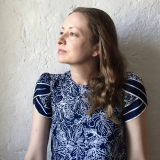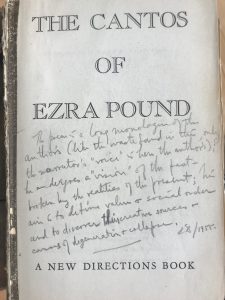By Karis Shearer*
Spending time in the Louis Dudek Collection at McGill over the summer of 2019, as I was finishing up my book manuscript, was immensely valuable to me, but it was not the first time I’d visited. You see, when I came to McGill as a postdoctoral fellow in 2008 to work on the poetry and correspondence of Louis Dudek, I learned the university had recently acquired his personal library. I was excited to see it. At that time, however, there was one catch: it had not yet been processed and was still in boxes. Nevertheless, the staff at McGill Special Collections went out of their way to let me access a few books of particular interest and I’ve been very grateful for this.
Having had a small taste of the collection a decade ago, and now living much further away in British Columbia, I returned to McGill in 2019 with the support of a Raymond Klibansky Research Grant to work with the fully catalogued Dudek collection. What is remarkable about the collection is both the topical scope of Dudek’s library (to say he read widely is an understatement!) and the degree to which Dudek annotated many of his books, providing valuable insight into how he interpreted the texts, what questions he had, or simply what he felt was compelling enough to underline. Dudek’s oldest copy of Ezra Pound’s The Cantos, for instance, was heavily annotated over the years with different pencils and pens showing how deeply he engaged with it and, at times, how his ideas changed. Fortunately for researchers, McGill’s robust new catalogue system makes all of this discoverable by allowing researchers to organize their search results in a number of ways, including most heavily to least heavily annotated books. As such, this richly accessible collection will be of great value to those interested in Louis Dudek, international modernism, and Canadian literature. I hope they will enjoy working with the collection as much as I have.

*Karis Shearer is an Associate Professor in the Department of English and Cultural Studies at the University of British Columbia (Okanagan campus) where she directs the AMP Lab. Her research interests include the digital archive, literary audio, Canadian modernism, and women’s labour in poetry communities.














Leave a Reply
You must be logged in to post a comment.